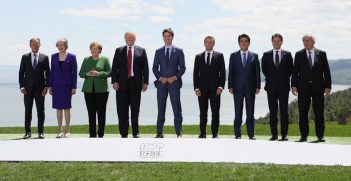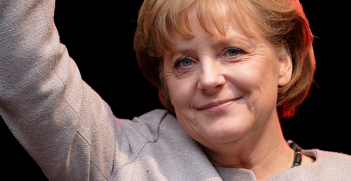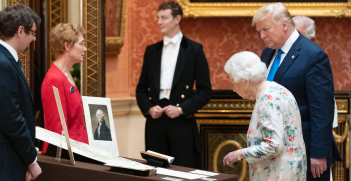Seven Go to Biarritz

In recent years the G7 has clearly been divided. Although this year’s meeting produced no consensus on burning issues, it did provide some glimmers of hope.
Once upon a time, G7 – a group of seven rich nations in Europe together with North America and Japan – were bound together as closely as limpets. Meeting yearly in historic castles or fancy resorts, their leaders would invariably make the state of the world economy the first and most important item of discussion, before moving on to threats to global and regional security and concluding, briefly, with a discussion about the world’s disadvantaged.
As BBC economics correspondent, I covered the first five G7 summits, starting with the first, assembled by President Giscard d’Estaing of France. Then, there were just five other leaders in the ‘club’: Britain, Germany, Italy, Japan and the United States. After three years, Canada was invited to join.
The meetings were informal, but there was always a communiqué which was usually drafted before the meeting began; each was as predictable as the last. Some sentences appeared after each meeting. “We will continue the fight against inflation,” was one. Inflation, for the moment, is past history. There was always a paragraph (or more) about the need for economic growth. Another clause, that should have as much resonance today, expressed unanimous support for free trade and commitment to fight protectionism.
Spool forward three and a half decades. The G7 comprises the same seven countries, but their leaders no longer sing from the same hymn sheet. Indeed, their discord is palpable. This year it was loud and widely disseminated before, during, and after the two-day meeting which took place in the grandest hotel in France’s Cote Basque.
In truth, though, G7 unity has been fraying for some years. It has become much worse since Donald Trump became US president in 2016, and began a process of foreign policy initiatives that other G7 members found disruptive.
By the time we came to Biarritz, President Emmanuel Macron of France decided damage limitation was essential. He wisely canned the idea of a communiqué, following the debacle at the previous G7 in Ottawa, when Trump refused to sign the agreed draft after a row with the host, prime minister Jason Trudeau. Macron said: “We are living through a deep crisis of democracy. No one reads the communiqués, let’s be honest. And in recent times you read the communiqués only to detect disagreements.” Macron added that at previous summits leaders had stayed up late at night trying to agree on the words of a final statement and considered it “ a waste of time”.
The time saved in Biarritz was put to good use with intensive discussions on a powerful agenda, including climate change, especially the need to save the Amazon rain forest; the Iran crisis; the taxation of multinational tax avoiders; fears of recession with slowing growth in Europe and North America; the US-China trade war; the behaviour of Russia’s Vladimir Putin, and, inevitably, Brexit. Boris Johnson was the new boy among the assembled G7 leaders.
There was no consensus on any of these burning issues. The best that can be said is that there was agreement to disagree on some of them. Arguably, the deepest divisions were on Russia and trade. It seems that the closed meetings were conducted largely without acrimony, with the American president accepting the many shades of opinion without feeling the need to tweet any irritation he may have felt, preferring to express his pleasure at being involved. Trump publicly praised Macron for running a great meeting, saying it had achieved ‘tremendous unity’.
Examining the issues one by one:
- Climate Change. It was 6 against 1, with no chance of persuading Trump back into the Paris accord or into any other target on emissions. But Macron did achieve success with what he set as his principal goal – a concerted effort to try and save the rain forests of the Amazon basin. After extending G7 into a third day, on Monday Macron announced a G7 agreed $US 29 million package to help Brazil and its neighbours fight the fires, and a long term effort to restore rainforest with a package of measures, including grants. But even here there was disagreement, both inside and outside the meeting on suggestions that the recent European Union free trade deal with the Mercosur countries should be blocked unless Latin American countries did more to prevent further harm to the rainforest.
- Iran. There was tension when Iran’s foreign minister, Mohammad Javad Sarif arrived in Biarritz to discuss preserving the Iran nuclear agreement, from which the United States controversially withdrew earlier this year. He had been invited by President Macron, who called Trump in advance and secured his agreement. Clearly Macron hoped that this might reconcile the US president to rethink his view that the Obama-led agreement was a ‘very bad deal’. As it happened, Sarif did not attend a G7 session or meet with Trump and his White House entourage. He engaged first with Macron and then with French and Iranian officials for about three hours, away from the official venue. Before flying home, Zarif said he had also talked to officials from Britain and Germany.
- Russia. Concerns about Russian actions in Ukraine were discussed, with Brexit the main point of contention. Trump had suggested ahead of the meeting that President Vladimir Putin should be invited. (After the collapse of the Soviet Union G7 had been extended to G8 to welcome the first Russian Federation president, Boris Yeltsin, but was expelled in 2014 when Putin annexed Crimea). Britain’s Boris Johnson, Germany’s Angela Merkel, and European Union president Donald Tusk, who attends G7 meetings, all voiced strong opposition to Putin being invited to the 2020 G7, to be held in the US. Tusk was vehement: “When Russia was invited to G7 for the first time, it was believed that it would pursue the path of liberal democracy, rule of law, and human rights”, he said. “Is there anyone among us, who can say with full conviction, not out of business calculation, that Russia is on that path?”
- Free trade and the US-China trade war. Tusk was also vocal on this issue. “Trade deals and the reform of WTO are better than trade wars. Trade wars will lead to recession, while trade deals will boost the economy”, the EU president declared. Contrary to some people’s expectations, the UK’s Johnson agreed, making it clear Britain shared Tusk’s view of open, global trade. On the trade war with China, Trump was ambivalent, appearing to confuse even himself. Just prior to G7, he announced a further rise in tariffs levied against the Chinese and controversially ordered the largest American companies to look immediately for ways to pull out of China. Later he referred to China’s president (not at G7) as an enemy of the United States. However, over the weekend he was heard to say he had ‘second thoughts’ about his earlier remarks, only for the White House press secretary to brief news media that they had misinterpreted Trump, whose “second thoughts” really meant that he wished he had pushed tariffs on China even higher. Come Monday, Trump changed tack again, calling Xi a “great leader” and, after calls from Beijing, telling president Abdel el-Sisi of Egypt he would soon be ready to meet Xi, and “make a deal”.
- Brexit and the rest. There was considerable discussion on Brexit, with the Europeans anxious about the probable impact of a no-deal Brexit on October 31, but there were no new ideas on how to avoid it. Possible alternatives to the controversial and deal-blocking Irish backstop were discussed at fringe meetings. One suggestion was for new anti-smuggling legislation to be passed both by Westminster and Dublin, with all commercial and service transactions to be pre-notified on-line, and heavy fines for entities ignoring the new laws. But time is running out and it may not be possible to find agreement within the few remaining weeks. There was no proposal to breathe new life into the world economy, and the thorny issue of taxing digital-focused multinationals appeared to be inconclusive, but in one of the two sessions Australia’s Scott Morrison was invited to attend, G7 leaders praised his move to stop social media showing video of terrorist attacks. Morrison was singled out for personal praise from Trump in the president’s lengthy final news conference. He said he looked forward to honouring him at an upcoming state visit to Washington.
G7 proved a good debut for Johnson. He could so easily have angered the Europeans and irritated Trump, but skilfully avoided falling into the trap of taking sides. His first meeting as PM with Trump went smoothly. When Trump again promised a ‘really good trade deal – the best we’ve done’, Johnson was candid enough to say negotiations could be difficult and would take time, later telling reporters it would be at least a year.
His notorious reputation for white lies came to the fore when, in humour, he railed at Trump because iconic Melton Mowbray pork pies were banned by the US FDA, whereas they sold well in Iceland and Thailand. When broadcast on BBC’s Today show on Monday morning, one surprised listener was the CEO of Melton Mowbray who called in to say it had no sales in either Iceland or Thailand. As with Trump, we are learning not to take all of Boris’s statements at face value, something Australian ministers should remember.
So was G7 worth the huge expense, the security cordon round Biarritz, with 13,000 police officers drafted in, clearing out holiday makers from five-star hotels and the main beach?
Gordon Brown, a former UK prime minister and veteran of G7 meetings, told the BBC, “It really should be called G-zero. The world is more divided than I can ever remember. That means the G7 is impotent”.
That seems a harsh judgment. President Macron and the assembled world leaders may not have solved all the world’s problems – that was never going to happen – but everyone left with more hope than when they arrived, and Macron was able to bind all leaders into a solid commitment to save the Amazon rain forests. G7 is a work in progress.
Colin Chapman FAIIA is a writer, broadcaster and public speaker, who specialises in geopolitics, international economics, and global media issues. He is a former president of AIIA NSW and was appointed a fellow of the AIIA in 2017.
This article is published under a Creative Commons Licence and may be republished with attribution.





